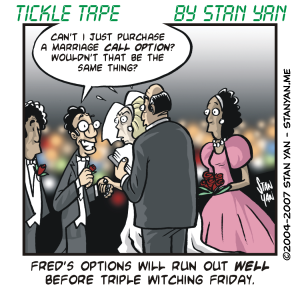Do you have trouble pulling the trigger? How many profitable trades have you missed because of this affliction? Why do you hesitate? If every trading idea that popped into your head turned out to be profitable, you would never hesitate. Unfortunately, you’ve probably learned the hard way that not every trading idea is a good one. There’s a good chance that a fantastic trading idea may not turn into a profit, and this fact alone can shake your confidence. And when you are not completely sure of yourself, you will hesitate.
Many traders, especially novice traders, yearn for infallible trading information. Their hard-earned money is on the line, and they demand certainty. But they can never know for certain that a planned trading strategy will work when it is actually tried. In the end, you have to be willing to take a risk and lose money. You have to accept the fact that no trading plan is foolproof and trading always involves some risk. Uncertainty and the fear of losing lie behind most traders’ tendency to hesitate. Sometimes there’s a good reason to feel afraid and hesitation is justified. Other times, however, hesitation is a reflection of inexperience or an irrational need to avoid risk and losses, even if it means standing aside unnecessarily and missing a significant market move.
In his book, “Trading to Win,” Ari Kiev suggests that novice traders don’t trust their instincts. They think they don’t have enough experience to take action on ideas based on sheer intuition. It takes experience to feel at ease with your intuition, and many novice traders understandingly question their instincts. But not all first hunches are inaccurate. Many times, they are right on target. Your first hunch may be astute, and little is to be gained by further deliberation. It is often wise to just act on a first hunch, but many traders don’t want to take the chance.
They want perfect, infallible information and confirmation. According to Dr. Kiev, however, the need for confirmation can distract you from taking decisive action. Self-doubt is understandable, but it can prevent you from tackling the markets and building up your trading skills. Dr. Kiev points out that over time you will learn to trust your instincts and act on them. In the meantime, many traders will waste time unnecessarily deliberating. But mulling over ideas too much can prevent you from learning to trust yourself. It’s natural to question your trading plan, but when you do so too much, you end up stagnating rather than making trades.
When your money is on the line, you naturally want to protect it. You have a strong tendency to feel that you must be thoroughly competent, the perfect trader. But when you strive for too much perfection, you will expend most of your limited psychological energy mulling over the negative consequences of failing. Instead, it is vital to focus on your immediate experience, what you are doing in the here-and-now to implement our current trading plan. The quest for perfection and guaranteed wins, however, are distracting and obscure the flow of immediate experience. Dr. Kiev points out that when you are distracted, you will have difficulty sticking with your trading plan. You’ll tend to make mistakes, and mistakes usually produce huge losses.
If you want to stop hesitating at critical moments of investing, it is vital that you learn to ease up. You don’t have to be perfect. You are bound to make mistakes occasionally, and if you are consumed with avoiding them, you’ll be so anxious and fearful that you will avoid taking action. Sure, you don’t want to make too many mistakes, but you can make a few, occasionally with little repercussions. All you can do in the end is to do your best and keep building up your trading skills. You might as well work hard and think positively. With enough time and effort, you’ll eventually achieve enduring success.


